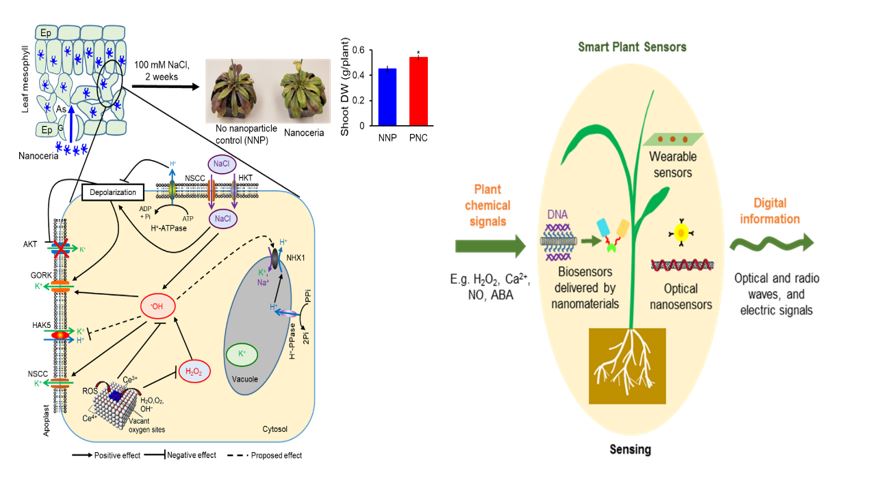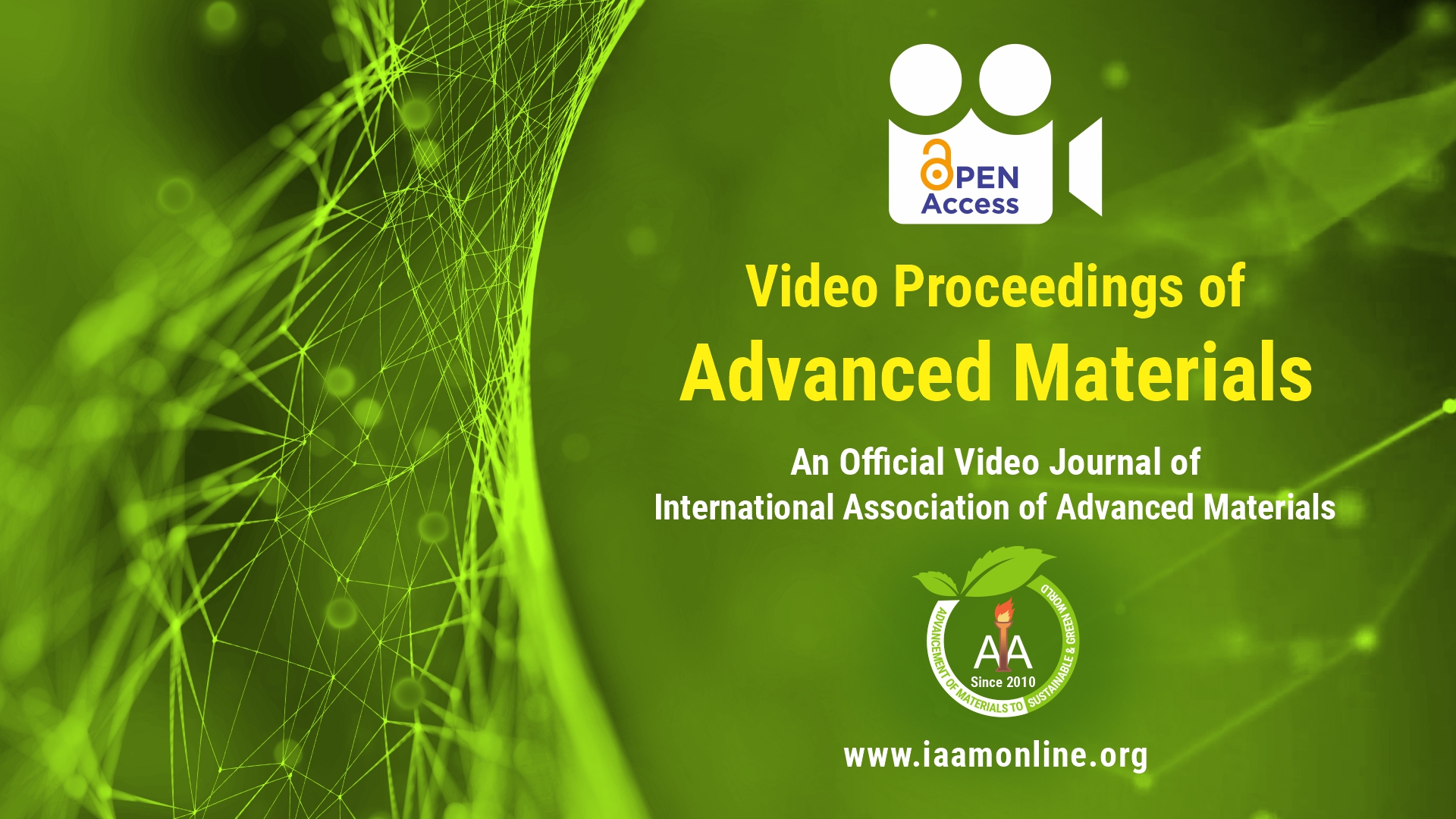Video Article Open Access
Nano-Enabled Agriculture: Use of Nanomaterials to Improve Plant Salt Tolerance and to Create Smart Plant Sensor
Honghong Wu1,2,*, Juan Pablo Giraldo3, Jiahao Liu1, Yanhui Li1, Robert Nißler4, Sebastian Kruss4
1College of Plant Science & Technology, Huazhong Agricultural University, Wuhan, 430070, China
2College of Agronomy and Technology, China Agricultural University, Beijing, 100083, China
3Department of Botany and Plant Sciences, University of California, Riverside, 92521, USA
4Faculty of Chemistry and Biochemistry, Ruhr-University Bochum, Bochum, 44801, Germany
Vid. Proc. Adv. Mater., Volume 3, Article ID 2206277 (2022)
DOI: 10.5185/vpoam.2022.06277
Publication Date (Web): 24 Sep 2022
Copyright © IAAM
Graphical Abstract

Abstract
To feed over 9.3 billion population in 2050, agricultural production needs to be increased over 60% at 2005-2007 level. However, efficient agricultural production is always limited by stress conditions in field. Conventional techniques such as breeding and field management have limitations. New techniques or approaches should be tried. Nano-enabled agriculture is a hot topic. In past few years, we have conducted research to investigate how nanoparticles can improve plant stress tolerance and how nanotechnology can be used in plants to facilitate the development of nano-enabled agriculture.
In this presentation, I will mainly focus on the following topics:
1. Mechanisms underlying cerium oxide nanoparticles (nanoceria) improved plant stress tolerance. In our study, we found that negatively charged poly acrylic acid coated
nanoceria (PNC) with low Ce3+/Ce4+ ratio can effectively scavenge ROS (reactive oxygen species) to improve plant performance under high light, temperature, and salinity stress.
We further found that PNC scavenge hydroxyl radicals to modulate the activities of NSCC (nonselective cation channels) and KOR (K+ outward rectifying channel) channel to improve mesophyll K+ retention, thus enhancing Arabidopsis salt tolerance. In cotton, PNC enhanced shoot Na+ exclusion but not vacuolar Na+ sequestration and improved mesophyll K+ retention to increase plant salt resistance. Moreover, we found that upregulated Cu-Zn SOD (superoxide dismutase) and downregulated LOX-IV (lipoxygenase IV) isozyme activities are associated with nanoceria alleviated membrane oxidative damage and thus the improved salt tolerance in rapeseed. Overall, we systematically investigated the mechanisms underlying nanoceria improved plant salt tolerance and tried to address concerns regarding biosafety issues of nano-enabled agriculture.
2. Use of nanosensors to create smart plant sensor. We have proposed that use of nanosensors which can recognize the changes of signaling molecules in plant under stress with high spatiotemporal resolution to convert the chemical signal changes to optical or electric signals which can be monitored by agricultural equipment. It will allow plants to self-report its stress status and then communicate with agricultural devices to self-manage its own microenvironment to mitigate plant stress conditions. We explored a hemin complexed and aptamer DNA coated carbon nanotubes (10 μM H2O2 resolution) to monitor the in vivo changes of H2O2 in plant under UV, high light, and Flg-22 stresses. It shows good ability to use this technique to allow early stress detection in plants. Overall, our results showed that with the use of proper designed nanosensors, we are able to engineer plants to real-timely monitor the changes of stress signaling molecules and thus to allow self-management of plant microenvironment.
Keywords
Ion channels, nanosensors, reactive oxygen species, smart agriculture, stress response.
Acknowledgement
This work was supported by the NSFC grant (No. 32071971, 31901464), project 2662020ZKPY001 supported by the Fundamental Research Funds for the Central Universities, and joint project SZYJY2021008 from Huazhong Agricultural University and Agricultural Genomics Institute at Shenzhen, Chinese Academy of Agricultural Sciences to H.W.
References
- H. Wu, N. Tito, J.P. Giraldo*, ACS Nano, 2017, 11, 11283-11297.
- H. Wu, L. Shabala, S. Shabala, J. P. Giraldo*, Environmental Science: Nano 2018, 5, 1567-1583.
- J.P. Giraldo*, H. Wu, G. Newkirk, S. Kruss, Nature Nanotechnology, 2019, 14, 541-553.
- H. Wu, R. Nißler, V. Morris, N. Herrmann, P. Hu, S.J. Jeon, S. Kruss*, J.P. Giraldo*, Nano Letters 2020, 20, 2432-2442.
- J. Liu, G. Li, L. Chen, J. Gu, H. Wu*, Z. Li, Journal of Nanobiotechnoloy, 2021, 19, 153.
Biography
Honghong Wu currently is a professor at Huazhong Agricultural University. He works at the field of plant nanobiotechnology for agriculture. He published more than 50 peer reviewed papers with over 2000 times citations. His Google Scholar h index is 24 and i10-index is 35. His lab is mainly focused on understanding nanoparticle-plant interactions to help to improve plant stress tolerance and to facilitate nano-enabled agriculture. His research interest is mainly on the following points: 1) use of nanomaterials to improve plant stress tolerance and to investigate the behind mechanisms, 2) use of nanomaterials as platform to do controlled and/or targeted delivery of small molecules such as DNA, RNA and antioxidants, 3) engineer smart plant with nanosensors to allow plants to self-manage its microenvironment.
Dr. Honghong Wu finished his Ph.D. in Agriculture Science at University of Tasmania, Australia at 2015. During his PhD study, he mainly focused on understanding the role of Na+ and K+ transport related traits, e.g., Na+ exclusion, vacuolar Na+ sequestration, and K+ retention, in plant salinity stress tolerance. Then, he moved to University of California at Riverside for doing the postdoctoral research. In UC Riverside, he worked mainly on following projects: 1) investigating mechanisms underlying nanoparticles improved plant stress tolerance, 2) developing nanosensors to monitor the changes of signaling molecule in plants under stress and to engineer smart plant, 3) developing nanoparticle tools to delivery functional genetic materials into plants without agrobacterium infection and gene gun bombardment.
Based on the achievements he made, he was elected to Sigma Xi (Full membership) and VEBELO Fellow and was nominated for the USERN prize.
Video Proceedings of Advanced Materials

Upcoming Congress



